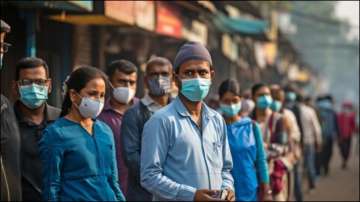Pneumonia outbreak in China: Karnataka govt issues advisory against seasonal flu after alert by Centre
As per WHO, there has been an increase in respiratory illness in northern parts of China. This is predominantly attributed to usual causes such as influenza, mycoplasma pneumonia and SARS-CoV-2.

Pneumonia outbreak in China: The Karnataka government's health department has put its healthcare infrastructure across the state on alert mode and has advised the general public to be aware of the seasonal flu virus in view of reports of a surge in respiratory illnesses among children in China.
The move comes following an advisory from the central government to States and Union Territories, urging them to promptly assess public health and hospital preparedness measures.
Here's health department advisory
“In view of the recent media reports of a surge in respiratory illnesses among children in China and the WHO statement on these reported cases, the increase in respiratory illness among children is attributed to the usual causes like influenza, mycoplasma pneumonia, SARS-Cov-2 and not due to any other unusual pathogen,” the office of the Commissioner of Health and Family Welfare Services in Karnataka said Tuesday.
Symptoms
The Karnataka Health Department also issued an advisory for citizens to be aware of the seasonal flu virus in regard to the same.
As per the advisory, seasonal flu is an infectious disease that spreads from person to person through cough or sneeze or through contact with droplets. This self-limiting disease lasts for five to seven days and causes low morbidity and mortality, the statement added.
“At-risk populations include infants, the elderly, pregnant women, immunocompromised and those taking long-term medications, particularly steroids, would require hospitalization,” it further said.
The symptoms include fever, chills, malaise, loss of appetite, myalgia, nausea, sneezing, and a dry cough that can last up to three weeks in high-risk groups. “Fever, chills, loss of appetite, myalgia, nausea, sneezing and dry cough lasting several days and sudden onset of malaise are common symptoms of this disease which may last up to three weeks in high-risk populations,” the health communique for the public said.
For those who suspect that they might have the flu, the advisory recommends visiting the nearest government healthcare centre and staying at home. It asks to use a face mask, avoid close contact with others at least seven days and not self-medicating without consulting a doctor.
Do's and Dont's
The advisory also mentions the do's and don't;s to avoid any kind of infection.
- Cover your mouth and nose with a handkerchief or tissue when you cough or sneeze.
- Wash your hands often with soap and water.
- Avoid touching your eyes, nose or mouth unnecessarily.
- Avoid visiting crowded places and if visiting such places use a face mask. Maintain a basic minimum distance from persons affected with flu.
- Sleep adequately, be physically active and deal with stress effectively
- Drink plenty of water and eat nutritious food
- Avoid spitting in public.
- Avoid travel to places with high incidence of Influenza and other respiratory illnesses.
Union Health Ministry advisory
Earlier on November 26, the Centre asked states to review hospitals' preparedness amid the China pneumonia scare. The statement from the Health Ministry came in view of recent reports indicating a surge in respiratory illness in children in northern China.
"In view of the recent reports indicating a surge in respiratory illness in children in northern China in recent weeks, the Union Health Ministry has proactively decided to review the preparedness measures against respiratory illnesses, as a matter of abundant caution. This is noted to be important in view of the ongoing influenza and winter season that results in an increase in respiratory illness cases. The government of India is closely monitoring the situation and indicated that there is no need for any alarm," the ministry said.
Union Health Secretary has also written a letter to States and UTs advising them to immediately review public health and hospital preparedness measures. "All States and Union Territories have been advised to implement 'Operational Guidelines for Revised Surveillance Strategy in the context of COVID-19', shared earlier this year, which provides for integrated surveillance of respiratory pathogens presenting as cases of influenza-like illness (ILI) and severe acute respiratory illness (SARI)," the ministry said.
Also Read: Mysterious pneumonia outbreak in China, should India be worried?